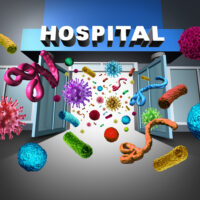Hospital-Acquired Infections a Major Threat to Patients

A stay in the hospital is a source of concern for a number of reasons. Not only is your health at risk due to the condition sending you to the hospital, but also, hospital patients run the substantial risk that they will incur a serious infection while an inpatient. Read on to learn about the problem of hospital-acquired infections, and speak with a New York medical malpractice attorney immediately if you believe you’ve acquired an infection from a hospital stay.
According to the Centers for Disease Control and Prevention, roughly 1 in every 25 hospital patients is currently suffering from at least one infection they received while an inpatient. These illnesses are commonly termed healthcare-associated infections, and they affect some 650,000 patients every year, with 75,000 of those individuals dying from their infection. Based on these numbers, death from infection received in the hospital is the eighth ranking cause of death in the US.
Numerous common infections in hospitals are based on antibiotic-resistant bacteria, such as MRSA and CRE. C. difficile is a potentially-lethal bacterial infection that takes the form of gastrointestinal illness and diarrhea. Catheters and other devices that are inserted, such as IVs, carry particularly high infection potential, since both the device itself and any open wound around the insertion point allows for greater infection opportunities. The longer that catheters and IVs are left in, the greater the opportunity for a patient to suffer a urinary tract infection or infection of the blood.
Hospitals have a duty to keep the potential for infection front of mind when treating patients. Medical facilities can be held financially liable when patients receive serious infections and those infections could have been prevented, or when medical staff failed to begin treatment of those illnesses as soon as they were detected. There are specific actions that hospital staff should take to protect you from an infection while a hospital patient, such as the following:
-
Staff should wash their hands regularly and thoroughly, including whenever they are about to touch a new patient or a patient requests they do so.
-
If a patient has a catheter or IV, staff should ensure on a daily basis that these implements are still necessary; if not, these devices should be removed immediately.
-
Proper wound or surgical site practices should be followed, including through the use of dressings that require fewer changes, such as surgical glue or waterproof dressings that minimize exposure of the wound to airborne bacteria.
-
Staff should follow the latest good practices in antibiotic use and dosing.
If you or a loved one has suffered serious injury or death as the result of careless medical errors or poor treatment, contact the Hudson Valley medical malpractice lawyers at Rusk, Wadlin, Heppner & Martuscello, LLP for a consultation on your case, at 845-331-4100 (Kingston), or 845-236-4411 (Marlboro).

